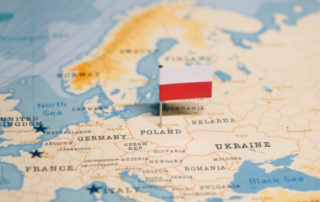Some geopolitical risks remain for years, even decades, while others may seem to come and go within a few months. Typically, though, even these risks have built up for years. Those who pay attention to signs of geopolitical turmoil can recognize where issues are likely to arise. Infortal’s experts in this area have put together a list of the top geopolitical risks for 2023 in order to best advise our clients.
If you’re considering purchasing businesses in other countries, contracting with international vendors, or expanding your business globally, here are some of the risks you need to know about. We’ve organized them into five different regions. Of course, these are only some of the major geopolitical risks for 2023. If you’re going to do any business in another country, you want to make certain you understand all of the local and regional risks as well as these major global ones. You’ll want to reach out to Infortal to discuss these local risks and for a full analysis of any potential business partners or acquisitions.
The Middle East does tend to be a fairly volatile area. Numerous geopolitical risks have occurred in the area, including the Gulf War in the early 1990s. In 2023, one of the biggest risks in the area is in Iran. Protests have been occurring in the country since July of 2021. These protests occurred due to several reasons. Initially, the protests were over water shortages, but after the government responded with severe brutality, the protests shifted to focus more on overthrowing the government.
Towards the end of 2022 and in 2023, protests have focused on the death of Mahsa Amini, a woman who had been arrested for allegedly wearing her hijab in an improper manner. She was killed while in police custody. Since then, the Iranian government has restricted internet use, especially social media, and retaliated with violence towards the protestors.
Saudi Arabia is also a source of some geopolitical tension. The Biden administration had asked the country to increase oil production to balance out the oil that was being boycotted from Russia due to the war in Ukraine. However, Saudi Arabia and OPEC declined to do so. At the same time, China and Saudi Arabia have become closer trade partners, and the country has been purchasing a good amount of oil from the Middle East. In return, Saudi Arabia has purchased weapons from China that the U.S. has been unwilling to supply. While Saudi leaders state that they believe they can help bridge the gap between the U.S. and China, tensions remain high.
Latin America has gone through several political regime changes, with more to come. In 2023, Argentina, Guatemala, and Paraguay will hold general elections. Mexico will hold several state elections, while Ecuador has a referendum on amending the country’s constitution. With these and other elections in Panama, Haiti, Peru, Dominican Republic, and Venezuela that could impact leadership in those countries going forward, it’s safe to say that the political stability of Latin America as a whole is no longer as certain as it once was.
In several countries, including Cuba and Nicaragua, authoritarian dictatorships have ruled for years. Others, such as El Salvador, appear to be moving in this direction. Other countries, such as Honduras and Haiti, are fairly unstable. Acquiring a business in these countries could result in great financial loss should things destabilize further. Suppliers and manufacturers working in these countries could find it difficult to ship products, leading to delays that could affect your deadlines.
While the political instability and other concerns should give you pause when considering some countries of Latin America, others continue to offer great investment opportunities. You will want to do your due diligence before signing any contracts, though.
While much of the concern in Europe has focused on the war in the Ukraine, there are other concerns that you need to be aware of. Leaving Russia and Ukraine as its own separate issue, Europe is facing some other riots and shortages. In France, for example, protests against President Macron and his administration’s policies began in January of 2023 and, as of May 2023, continue.
The main cause of the riots is Macron’s attempt to overhaul the French pension system. As part of this overhaul, he wants to raise the age of retirement to 64, up two years from the current age of 62. Workers are especially angry with his decision due to the way it was implemented: Macron used a specific part of the French constitution to implement the change without any type of vote by the National Assembly. Companies doing business in France right now must be prepared for labor strikes.
In addition to this instability, other issues plague Europe. An energy shortage, partially caused by sanctions against Russia, are beginning to cause issues. While not as bad as predicted, oil and natural gas shortages are still a concern, especially since Saudi Arabia has declined to increase production. Without cheap Russian natural gas, costs to consumers have increased, with many people in the EU seeing their electricity costs increase. In 2022, the energy inflation rate hit highs of over 40 percent. While this rate has been lower in 2023, it is still concerning. Doing business in countries with incredibly high energy costs is going to impact your bottom line.
The war in Ukraine has made the entire region unstable. Many companies who were doing business in Ukraine have had to completely pull out of the country, losing their real estate as well as their inventory, equipment, and much more. The war is now in its second year, and its impact on the region and on the world continues to be significant. Many nations are continuing to support Ukraine in various ways. Many are also placing sanctions and other penalties on Russia in an attempt to use economic warfare to bring an end to the conflict.
As we’ve already discussed, the sanctions on Russia have had a major impact on the energy industry, especially in regards to oil and natural gas. By refusing to purchase the cheaper Russian oil and natural gas, countries have faced shortages while also dealing with a rising energy crisis. While there are no immediate risks of Europe and other parts of the world running out of these resources, that could change if the war drags on for years. Long-term energy solutions need to be put in place now in order to avoid resource scarcity and economic hardships later.
In addition to energy, there are other commodities that could become scarce. Russia and Ukraine are both major suppliers of wheat and other crops, which could result in food shortages in parts of the world. While markets are currently not disrupted and prices have adjusted, the longer the war goes on, the more likely that will change.
The geopolitical risks in Asia tend to surround Russia and China. China, in particular, is a risky place to do business due to Xi Jinping’s regime. His administration is considered unrivaled, but that brings with it a number of risks. China has a major impact on the global economy, and one misstep by the country’s leadership could greatly impact the world. Because Xi’s administration has worked to take control of the economy, the country is somewhat volatile, and it’s hard to predict what could occur.
Of course, China is also recovering from COVID-19. In addition to taking its toll on the country, it also greatly impacted China’s relationship with the world because there are many who blame China for the pandemic. This has driven some anti-Chinese sentiment in other countries and may have played a part in reinforcing China’s nationalist policies.
While the relationship between the U.S. and China remains rocky, the country has strengthened its ties to Russia. Both countries distrust the U.S. and much of the West, and a meeting between Xi and Vladimir Putin in March of 2023 furthered that sentiment. While China has not gone so far as to openly give any support to the Russia-Ukraine war, that could change. Backdoor deals may also be taking place. Should China decide to fully support Russia, the U.S. and other countries could place new sanctions on China. This would affect many businesses that have Chinese suppliers or use Chinese manufacturers.
Dealing with geopolitical risks is something every business must do. While you can’t change the political stability of a country or impact the war in Ukraine, you can understand what risks you’re taking on when you merge or acquire a company or contract with an international vendor. By working with Infortal to learn more about the risks involved with specific regions or countries, you can make an informed decision and reduce the risks your company takes on. We have the resources and experience to highlight the risks you’ll face as well as any suspicious behavior the company you plan to acquire has done in the past or that a potential vendor engages in.
To learn more about how Infortal can help you avoid geopolitical risks, contact us today.



